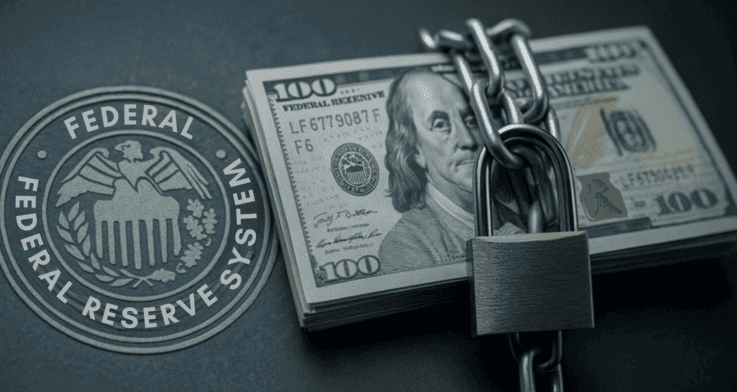The “Genius” That Ends Privacy Forever

We’ve been trained to greet every digital upgrade as a step toward progress. Banks replace checkbooks with apps and call it freedom; stores nudge us to tap-to-pay, assuring us it’s safer and more “modern.” Press releases glow with talk of efficiency and inclusion. Innovation, we’re told, is always a gift.
But smooth interfaces and optimistic headlines have a pattern: they invite us forward, gently, and rarely show what hides on the other side. The new system glimmers—until you realize the price is not just nickels and dimes, but a quiet surrender of privacy, autonomy, and choice.
The ultimate act in this slow drip of digital convenience arrived quietly this summer. President Trump signed the GENIUS Act—the first national crypto law in American history—while the country fussed over an election year. Its purpose? A federal framework for “safe” digital money. Its effect? The groundwork for a world where every single dollar can be tracked, traced, and controlled.
From Progress to Programmable Money
The headlines sounded harmless:
Consumer protection!
Trust for digital payments!
America leads in crypto innovation!
But beneath the phrasing, the law marks a turning point.
The GENIUS Act (Guiding and Establishing National Innovation for U.S. Stablecoins) creates strict guardrails for a new breed of currency: stablecoins. Unlike Bitcoin, these are pegged 1:1 to the U.S. dollar or short-term Treasuries, and every major U.S. institution must comply (). Private issuers cannot exist in the U.S. without full federal approval, and every coin must be backed and auditable on a real-time basis. No interest, no yield, just a digital cash twin—at first.
Supporters say it’s progress—protection from volatility and scams. What most people miss is what happens when these rails become the new money itself.
Programmable digital currency means every dollar is now software. The potential?
- Track where every payment goes and when.
- Restrict how, where, or even if you can spend.
- Freeze accounts at the flip of a switch—not just for criminals, but for anyone, anytime, under any new rule.
This is no longer a hypothetical. The law creates a template for money that is—by design—controllable at source and destination, upending what cash has always been: anonymous, permissionless, universal.
No one asked for it.
No one voted on it.
But the GENIUS Act is now law — and it gives the power to replace your cash with controlled digital dollars.
Once linked to banks, payroll, and retail, every purchase will be watched. Any payment can be blocked.
See how to shield your money before it’s too late <<
They didn’t need your permission to start.
They don’t need it to finish.
How Quiet Control Always Grows
History is clear, if we’re willing to see it.
After 9/11, the Patriot Act swept in “for security,” quietly expanding until everyday banking and travel habits were surveilled by default. The arrival of the FedNow system in 2023 was sold as “faster payments,” but also prepared the backbone for true programmable money—real-time, all-seeing, frictionless for both banks and regulators.
Each landmark started innocently—solving a real problem, allaying a real fear. The control, the loss of boundaries, came later, quietly, and was almost never reversed.
The GENIUS Act, too, is not an overnight leap but a slow-burn revelation. First, it’s about protecting investors. Next, it becomes a universal payments foundation. In a few years, it can be the only money most people interact with—by default, not by conscious choice.
Who Decides What You Spend?
For most of us, the change won’t sting at first. Apple Pay, Venmo, a sleek new wallet app—it’s all easier. But the backbone has shifted: with stablecoins and digital dollars, the ultimate key holder is never you.
If authorities want to:
- Audit your purchases, donations, or movements? They can.
- Freeze your account for investigation, tax review, or even the wrong tweet? Just a few keystrokes.
- Impose blackout dates, “emergency” taxes, or stimulus that must be spent at mandated shops? No mess, no delay—just code.
In the language of innovation, this is called “programmability.”
For everyone else, it’s a polite warning: privacy and autonomy are now the exception, not the rule.
Historical Parallels: The Control That Creeps
Silicon Valley, D.C., and every clever bureaucracy know this script:
The Patriot Act eroded boundaries under the banner of fear.
The FedNow system swept in with little debate.
The cashless, cardless “future” is sold as modern security—but in practice, every update means giving up a little more ownership, until you realize how much is gone.
Cash didn’t suddenly vanish; it was encouraged into extinction, one digital step at a time.
Sovereignty in a Digital World
It’s tempting to shrug and say, “that’s just the way things go.” But in every era, there’s a small window where ordinary people can act—while the old freedoms still exist, even as the new rails are being laid.
Your move is not to panic, but to prepare.
How?
- Diversify some wealth outside digital-only rails—explore physical gold, hard assets, or legal retirement rollovers.
- Learn about IRS Section 408(m), a little-known way to move a portion of retirement savings into legally protected, tangible assets—outside the programmable wallet.
- Keep some cash for daily use and emergencies, while it still spends freely.
- Stay curious—question every digital upgrade, and ask what’s gained and what’s quietly being surrendered.
Discover how to shield your savings — before every dollar you spend requires approval.
This isn’t a call for fear or doomsday prepping. It’s a gentle insistence on awareness—a minimalist truth quietly approaching:
Cash ends not with a bang, but with a quiet update, a new “feature,” a slow fade to a world where every dollar answers to someone else’s rules.
You can still choose sovereignty and privacy.
But the choice grows narrower every year.
Use it while you still can.
—
Claire West
